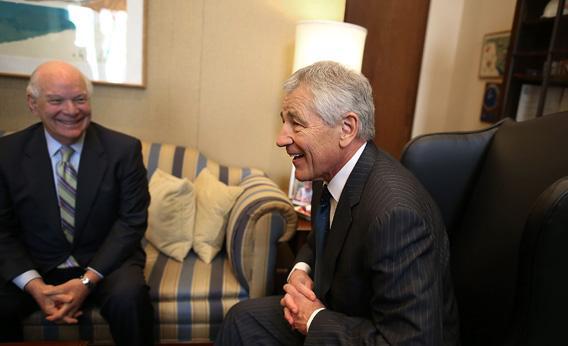In 2005, Congress passed the Protection of Lawful Commerce in Arms Act, a bill that made gun distributors and manufacturers immune from lawsuits. While no other industry enjoys this kind of special government protection, the National Rifle Association had pushed the law for years as its top priority. It hailed the act as “the most significant piece of pro-gun legislation in twenty years.” They were right. The bill wiped out a series of lawsuits brought by mayors across the country to hold the gun industry responsible for the carnage in America’s cities.
The NRA finally scored this legislative victory because of the help of an important and unexpected ally: the Pentagon. Under the leadership of Secretary of Defense Donald Rumsfeld, the Department of Defense said that the NRA-backed bill was necessary to protecting America’s gun industry. In turn, the NRA heavily promoted the Pentagon’s assessment that the bill would help protect national security. Without any evidence, the Pentagon’s top lawyer, Daniel Dell’Orto, said that the bill would “help safeguard our national security” by protecting “an industry that plays a critical role in meeting the procurement needs of our men and women in uniform.” Of course, no immunity exists for other industries that supply our armed forces with advanced weaponry or battle gear, but the Bush administration was determined to help advance the NRA’s agenda.
The Republicans used the Pentagon’s endorsement to paint Democrats and gun control advocates as weak on national security. Citing the Pentagon’s “extraordinary step” in supporting the bill, Rep. Candice Miller said that gun victim lawsuits would “force U.S. arms producers out of business” and would threaten “our national security.” Support for the bill was a matter of supporting “all of our men and women who serve in harm’s way in defense of our freedoms,” Sen. Larry Craig said. The implication was clear: If you supported the right of gun victims to bring a lawsuit against the industry that equipped their attacker, you were against our troops.
The NRA also attempted to play up the national security implications of the Pentagon’s support for the bill, claiming that the bill meant that U.S. soldiers “will not have to rely on France, China, or Germany to supply their firearms.” The claim was and remains absurd. Lawsuits never drove an American gun manufacturer bankrupt. The gun industry was certainly making enough money to bankroll the NRA. But the Pentagon’s stamp of approval was powerful: The law passed with 65 votes in the Senate, including 15 Democrats.
While the torture memos that the Bush administration lawyers wrote were overturned, the result of the Pentagon’s unorthodox intervention in America’s domestic gun debate is still on the books. That needs to change.
If he is confirmed, Secretary of Defense Chuck Hagel can undo the damage of this unholy Pentagon-NRA alliance by instructing the Defense Department’s general counsel to review its policy and issue a new statement. Just as the Department of Justice officially overturned the Bush-era torture memos, the Pentagon needs to reverse this unprecedented handout to the gun industry. Rep. Adam Schiff already is working to introduce legislation that would repeal immunity for the gun industry. The Pentagon need only add its own vocal support.
The goal should be to draw the gun industry into realizing that reducing gun violence is in its financial interest. In 2000, a coalition of cities, in conjunction with the Clinton administration, leveraged these lawsuits to persuade Smith and Wesson to implement common-sense safety measures, such as gun locks. If immunity for the gun industry is repealed, mayors across the country will be able to persuade the gun industry to accept reforms that make our streets safer. If the gun manufacturers refuse to settle these lawsuits, they will be forced to pay for rather than profit from gun violence.
The Pentagon isn’t supposed to be embroiled in domestic politics, and we have already paid an awful price for its decision to lobby on behalf of NRA-designed legislation. While in the Senate, Chuck Hagel voted for the Protection of Lawful Commerce in Arms Act. As Secretary of Defense, he should rescind the Pentagon’s blatant political posturing against gun control. At his confirmation hearing on Thursday, the senators who want to hold the gun industry accountable should ask Hagel how he would address this sad chapter in the Pentagon’s history.
